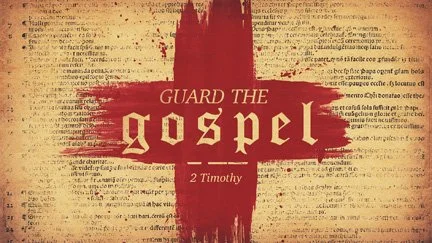There was a man named John Dear (no, not the tractor guy) who decided to enter the Jesuit order in the Catholic Church. But before he actually entered the order, during the summer of 1982, he decided to visit the Holy Land and walk in the footsteps of Jesus. On the day he left the United States, Israel invaded Lebanon. When he stepped off the plane in Jerusalem, he literally stepped into a war zone. Soldiers carrying machine guns searched him before allowing him to enter the terminal.
During his trip, John Dear visited the Chapel of the Beatitudes. This is a small, eight-sided church that stands on a hill overlooking the sea, where tradition says that Jesus delivered the Sermon on the Mount. Dear walked around inside, reading the words that had been inscribed on the walls: blessed are the poor; blessed are those who mourn; blessed are the meek; blessed are the peacemakers; blessed are those who are persecuted; love your enemies; do good to those who hate you; bless those who curse you; pray for those who mistreat you; give to everyone who asks you.
As Dear looked out the window and saw the Sea of Galilee below him, it suddenly dawned on him: “I think Jesus is serious.” He turned to look up at the sky and cried out to God, “Are you trying to tell me something? Do you want me to work for justice? Do you want me to be a peacemaker? Do you want me to love my enemies?” After a moment, he added, “All right, I’ll work for peace and justice for the rest of my life, if you’ll just give me a sign.” At that moment, two Israeli jets flew overhead, causing a sonic boom. Moments later, they dropped bombs along the border with Lebanon. At that moment, John Dear made two decisions: First, to devote the rest of his life to working for peace and justice. And second, to never again ask God for a sign!
Sooner or later, we also have to come to the realization that Jesus is serious about the Beatitudes, that Jesus is serious about the kind of life we are supposed to live. And the life that Jesus described in the sermon on the plain is a life that turns the world upside down. Philip Yancey wrote in an article in Christianity Today that Jesus’ teaching “expresses quite plainly that God views the world with different lenses.” William Barclay states that in the words of Jesus we find “a series of bombshells.” He goes on to say, “It may well be that we have read them so often that we have forgotten how revolutionary they are … They take the accepted standards and turn them upside down … Just imagine anyone saying, ‘Happy are the poor, and Woe to the rich!’ To talk like that is to put an end to the world’s values altogether.”
And that is exactly the point. Jesus is putting an end to the world’s values. Jesus is saying that the values of the Kingdom of God are exactly the opposite of the world’s values. While we may show honor to the rich, the powerful, the well-fed, the party hosts, and the popular people, Jesus is more interested in the poor, the hungry, the mournful, the bullied, and the excluded. They are the ones who will have an important place in God’s kingdom. They are the ones who will be richly rewarded in heaven.
Laura Sugg, associate pastor at Westminster Presbyterian Church in Charlottesville, Virginia, writes, “The poor and hungry are called blessed, for their fortunes will be reversed … Good news indeed – if you are poor, hungry, weeping, or excluded … but what of us who sit with bellies full, big smiles on our faces, at the nicest seats at the most exclusive restaurants? Good news? Not so much. The four blessings are matched point by point with ‘woe to you’ statements … If people in the pews (or at least the pews in many of America’s churches) are not squirming a bit when they hear these words, then they are not listening.” We are squirming because we realize that the blessings, for the most part, don’t apply to us. We are not, by and large, the poor, the hungry, the weeping, or the excluded, though we may go through short periods of time when we experience those things. We are the ones about whom Jesus says, enjoy your good times while you can, because they won’t last.
These teachings of Jesus are radically different from the values of our culture, but they were also radically different from the teachings of his own culture. For most of the Old Testament, there were certain assumptions made about who was blessed and who was cursed. If someone was prosperous, healthy, and blessed, then it was assumed that he or she was a good person, living in the ways of God. But if someone was poor, suffering, and cursed, then it was assumed that he or she had done something bad, so bad that God was punishing him or her. That theology was challenged by the book of Job, but it still persisted. And it still persists in our own day and age, if we’re honest about it. But is that the theology of Jesus?
Keith Errickson of Duke Divinity School writes, “Jesus radically challenges the dominant tradition of what God’s presence and blessings look life. As he identifies God’s blessing with the poor and hungry, Jesus not only connects his ministry with the marginalized, but also paints an unexpected picture of who God is. Gone is the image of the God of strength and power who identifies with the influential, who blesses the privileged, and whose presence is signaled by riches and political strength. Rather, just as Jesus is the perfect union of God with humanity, his presence and ministry to the sick, the lame, and the outcast demonstrate God’s solidarity with those who are hungry and weep. The wealthy and privileged regularly question and mock Jesus for ministering to and maintaining a presence with the sick, the poor, and the outcasts. However, just as his humanity reveals God in the flesh, so his ministry to the marginalized reveals God’s solidarity and presence with those whom society has forgotten.”
Gustavo Gutierrez is a Peruvian priest and theologian, whose major work was A Theology of Liberation, published in 1971. In it, he wrote about God’s preferential option for the poor, an idea that is found throughout Scripture, and especially in the gospel of Jesus Christ. Because of God’s particular concern for the welfare of the poor and powerless, Christians should show solidarity with and compassion for the poor through their words, their prayers, and their deeds.
Jesus certainly seems to be saying that God has a preference for the poor, the hungry and the oppressed in Luke’s version of the Beatitudes. And Jesus says that these are also blessed by God. That blessing does not involve material wealth or resources, but something much more important: a right relationship with God. And that relationship will lead to the blessings of receiving the Kingdom of God, being satisfied, and laughing with joy; ultimately it will lead to a great reward in heaven. Those who pursue wealth and material blessings in this life may receive them, but that is all they will ever have. And they will never be enough. Because those kinds of blessings do not bring true joy or meaning to life.
Like some of you, I really enjoy watching football. And it is no secret that NFL players make a lot of money. They make so many millions of dollars that I don’t know how they could ever begin to spend even a small percentage of it in this lifetime. But do they really have it all? Are they as blessed as we assume they are? Consider these statistics about the transition period most NFL players experience when they retire from the game:
65% of NFL players leave the game with permanent injuries
One in four players reports financial difficulties in the first year after retirement
of the NFL marriages that fail 50% fail in the first year after the player leaves the game
the suicide rate for active and retired football players is six times the national average
78% of former players are bankrupt, unemployed, or divorced within two years after leaving the game
Do we need any more proof that woes come to those who live by the world’s values?
William Barclay writes, “What Jesus is saying is this, ‘If you set your heart and bend your whole energies to obtain the things which the world values, you will get them – but that is all you will ever get’ … But if on the other hand you set your heart and bend all your energies to be utterly loyal to God and true to Christ, you will run into all kinds of trouble; you may by the world’s standards look unhappy, but much of your payment is still to come; and it will be joy eternal.” I remember putting a similar sentiment on a cross-stitch pillow I did for my youth director in high school. It said, “Work for the Lord. The pay isn’t much, but the retirement plan is out of this world.”
On this All Saints Day, I think about the saints – the lesser-known saints – who have chosen to live in solidarity with the poor, the mournful, the hungry, and the excluded, and who have made a difference in their lives. They are people like Billy Soto. Every day at 10:00 AM, Billy loads up his van with sandwiches, juice, hot chicken and rice, and drives through downtown Los Angeles to feed the homeless. His ministry is called Under the Bridge, named for the places where he makes most of his stops. Another group, members of the Highways and Byways outreach program, minister to the poor and homeless. Mother Pauline Jackson, a 74-year-old homeless woman, is one of the regulars, and the real heart of the service. She says, “I get up on Sunday, read my Bible, then come here. They provide that stability we need in our lives.”
There are Christian saints among us. There were saints before us, parents, grandparents, Sunday school teachers, missionaries, preachers, friends, and we remember them today with thanksgiving. We also need to remind ourselves that our lives will not be measured by the world’s standards, but by God’s standards. And we might do well to remember the epitaph of Charles George Gordon, a 19th-century soldier buried in St. Paul’s Cathedral in London, which reads: “To Charles George Gordon, who always and everywhere gave his strength to the weak, his substance to the poor, his sympathy to the suffering, and his heart to God.”









